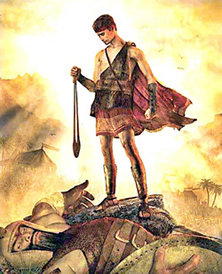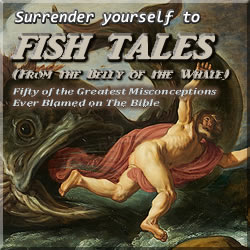A Firm Foundation (Cont’d)
To Weave a Tapestry
The next key takeaway from Tales of Forever, which feeds directly into the main thesis of On Earth, is that the dramatic narratives of The Bible reveal a truth far more potent than the typical view of Scripture as being a mere guide to right and wrong modes of human behavior.
Therefore, Tales of Forever seeks to establish a solid awareness of the role of biblical typology, in which we see how the stories of the patriarchs don’t just record the lives of folks who encountered God and who had various reactions to those encounters.
Instead, when we look at the whole record of Scripture, we see how God entered into the very lives of these people to weave a tapestry for the sake of an onlooking world. In short, Scripture doesn’t just record random stories, here and there; instead, it tells the stories of lesser messianic figures like Enoch, Noah, Abraham, Isaac, Moses, Joshua, and David in such a way that they foreshadow the role that the ultimate messianic person, Jesus Christ, played in God’s redemptive plan for humanity.
As such, the life of Abraham doesn’t just tell the story of someone who was lucky enough to have God single him out, talk to him, and rescue him from a life of wandering aimlessly about. In the context of biblical typology, Abraham was actually a stand-in for all humanity who are in a far worse condition than any of us cares to admit.
Story Continues Below
Says Richard Price—the founder and CEO of Academia.edu—on his podcast In Depth With Academia:
On Earth as It is On Heaven: The Promise of America, Technology, and the New Earth is:
To hear Price’s book review of On Earth as It is On Heaven, CLICK HERE.
To watch author and historian W. Kent Smith discuss the contents of his book On Earth as It is On Heaven, at the Sacred Word Revealed Conference ‘23, hosted by Zen Garcia, CLICK BELOW.
Story Continues From Above
Thus, in response to God’s audacious promises, Abraham asked: “How will I know, Lord, that you’re telling me the truth? Not that I doubt You. But because I doubt myself, because I doubt my worthiness to receive such wonderful promises as You’re describing.”
So how did God respond to Abraham when he asked for evidence—as any sane person would—that He wasn’t hallucinating? God gave Abraham—and all of us—a marvelous way to verify the truthfulness of His promises. He told him:
Certainly you’ll know I’m telling you the truth when you see how I treat your descendants in the days to come, when you see them wandering for many years as strangers in a strange land. Then after becoming slaves, they’ll suffer terribly at the hands of their overlords, but then in the fourth generation, they’ll come out richer than when they went in.1
The important thing to understand about this scenario is, to those who appreciate God’s habit of typological revelation: This wasn’t just a way to confirm the truth to Abraham when God promised him descendants like the stars, and the gift of land previously owned by others. It was also a window into the human condition, of which Abraham and his descendants would act as surrogates for all peoples and for all time. In other words, God wasn’t simply promising Abraham a marvelous destiny for his sake alone but for the sake of every living human being—past, present, and future.
That is to say, God would work out a universal mystery, in Abraham, that actually began when Adam fell from grace and was cast out of the Garden as the first “wanderer” and “outsider.” Originally acting as the master of God’s creation, Adam became a slave of Satan, and so was doomed to wander the Earth as a stranger in a strange land. But fortunately, because God is both a God of mercy and a God of “set times,” the times of divine punishment are not eternal in nature.
Now, without going too deep at this point, I mention this in passing to make one important point, which is to confirm the pattern in Scripture, of God’s consistent habit of periodically removing His blessings from mankind but then just as consistently restoring those blessings right on time. If you reject this, however, if you reject that God provides humanity with signposts as to His times of punishment and restoration, then you’ll certainly reject the main thesis of this work. On the other hand, if you do acknowledge this timeless pattern of “give and take,” then you’ll be perfectly attuned to the idea that biblical figures like Abraham really do act as God’s type for humanity.
In Abraham’s case, then, although he faithfully embraced God’s call by leaving his father’s home en route to an undiscovered country, that state of having been “called out” didn’t immediately deliver him from the foibles of human nature. Till the day he died, Abraham wrestled with the same state of spiritual ignorance, alienation, and slavery that haunts us all whether we realize it or not. Contrary to church tradition, which wants to declare Abraham an instant saint, he still failed many times in his journey of faith; he lied repeatedly—to himself and to others—even though from his point of view he was just trying “to help” God keep His promises. But in the end, despite God’s imputation of righteousness for his faith, Abraham was still a slave to death, Hell, and the grave, until such time as Christ broke asunder that condition into which every human has been born ever since Adam was exiled from the Garden.
Concerning this interplay between ignorance and enlightenment, between alienation and restoration, between slavery and freedom, we’ll have more to say as we continue in this work.







